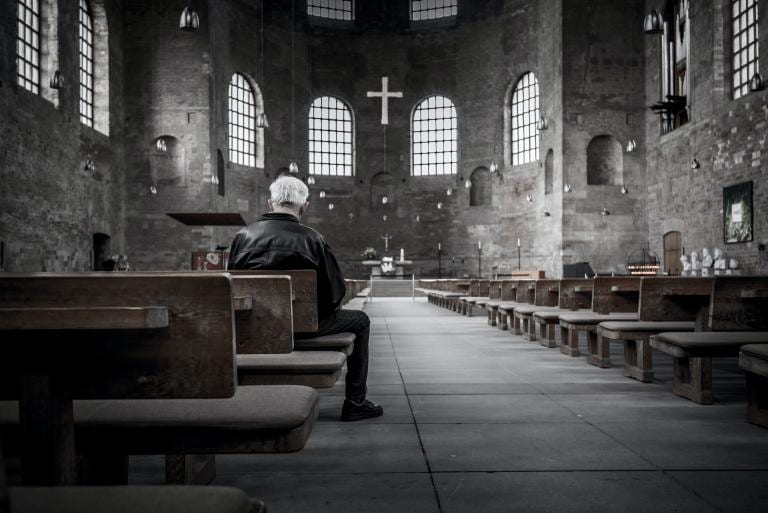2 Peter 3:8-15a
Do not ignore this one fact, beloved, that with the Lord one day is like a thousand years, and a thousand years are like one day. The Lord is not slow about his promise, as some think of slowness, but is patient with you, not wanting any to perish, but all to come to repentance. But the day of the Lord will come like a thief, and then the heavens will pass away with a loud noise, and the elements will be dissolved with fire, and the earth and everything that is done on it will be disclosed.
Since all these things are to be dissolved in this way, what sort of persons ought you to be in leading lives of holiness and godliness, waiting for and hastening the coming of the day of God, because of which the heavens will be set ablaze and dissolved, and the elements will melt with fire? But, in accordance with his promise, we wait for new heavens and a new earth, where righteousness is at home.
Therefore, beloved, while you are waiting for these things, strive to be found by him at peace, without spot or blemish; and regard the patience of our Lord as salvation.
+++++
I can’t remember where I heard the expression, “Patience isn’t my long suit.” It’s been around for a long time. Merriam Webster suggests that the phrase goes back to at least 1742 and derived from card-playing.[i]
But the phrase expresses a much older sentiment than that. In fact, it’s pretty much a universal feature of human life. I can’t recall or even imagine anyone ever saying, “Patience is my long suit.” By and large, we are – as a race – impatient and – as the speed at which our society moves continues to accelerate – we are becoming even more impatient.
To be honest, if we celebrate patience at all, we celebrate it in retrospect, and we celebrate it because there is an implied benefit to it that we see – mostly – in retrospect. Self-help books are full of those stories. Writing about his career on in the NBA, Michael Jordan, for example, tells about his career as a basketball player. Jordan writes, “I’ve missed more than 9,000 shots in my career. I’ve lost almost 300 games. Twenty-six times I’ve been trusted to take the game-winning shot and missed. I’ve failed over and over again in my life. And that is why I succeed.”
All that’s fair enough in one way. “Slow and steady wins the race.” “Discipline pays off.” “Rome wasn’t built in a day.” As quickly as we wish life would move, some things cannot be accomplished overnight. Discipline and focus are important.
But Peter isn’t talking about this kind of patience. The patience he encourages his readers to embrace and the patience that he describes God as having are something very different. Translated into English, using the word “forebearance,” the kind of patience Peter has in mind implies endurance and control practiced for the sake of others. The kind of patience that provides space for healing, growth, and restoration.
Practiced by God, it is the kind of patience that holds out the hope that there will be time for those who are lost and struggle, who are trapped and embattled, for those who are wounded and bleeding. It is the kind of patience that even holds out hope for those who willfully reject the love of God and have yet to recognize their need for God. People who are angry, alienated, certain that they don’t need God, even people who are convinced that there is no God.
Practiced by people of faith, it is the kind of patience that comes alongside God’s patient care and bears the struggles associated with that companionship. Christians, Peter is saying, are those who are already at home in God. They know that is where they are kept safe. It is there that their lives are centered.
So, in the name of extending that healing and saving grace to others, they, too, practice forebearance or patience – not for their own sake – not in the name of achieving a long-term, personal goal – but in the name of ensuring that others find the same forgiveness, love and mercy that they themselves have received. This kind of patience is other-directed, sacrificial, and tempered by goals that are not worn thin by frustration with life as we experience it but are shaped by the realization that God’s purposes are the only ones that finally matter. Shocking though it may be to modern sensibilities, this is why Peter emphasizes that God lives beyond time, acts with greater speed than we might think, and will finally establish a new heaven and earth where righteousness reigns unchallenged.
So, what does “patience for the sake of others” look like? Let’s be practical:
One, it is patience that has a capacity for growth and struggle.
Anyone who has ever been a parent – or anyone who has paid any attention to their own struggles – knows how important a capacity for growth and struggle can be for us at any stage of life. Growth and maturity are not achieved over night. Growing into the people that God intends us to be is not something that can be done without listening, struggling, and making mistakes along the way.
The paths to which we are called and the lives we are called to live are not “written in stone.” We live into them over time and living into them involves exploration and discovery.
Patience for the sake of others understands this, and it has a capacity for the growth and struggle that is involved. It doesn’t judge people for having those struggles. It doesn’t deprive people of the time that it takes for them to find their way. It offers help when and where it is needed. It stands by when there is nothing to be done, but to remind someone that they are loved.
It also knows that failing to allow people to struggle appropriately can be bad for our children and for others. In fact, sometimes intervening can be impatience. The helicopter parent who intervenes in a child’s acquisition of the skills and temperament that make for a healthy adult life often short-circuits maturation and encourages dependence and it can even rob a child of a sense of moral responsibility.
Teaching undergraduates years ago, I flunked a student for plagiarizing a research paper. Days later his father was at my office door, demanding to know how I could be sure that his son had copied his paper from other sources. My response was to note that his son had an amazing command of Victorian English and that most of those people were dead. Even that and the stack of books that he had used did not deter his father from objecting to the grade that I gave his son. But the loser was his son and his grade had nothing to do with it.
Two, patience for the sake of others does not discriminate.
Many of our friendships are tailored to our needs. They are based upon common pursuits and interests and we lapse into them without thinking about it. Even in the typical church, people this is often the case. Established friends gather together for conversation and gravitate to work that they share.
There is nothing wrong with this, perse, but patience for the sake of others is centered on the needs of people that are not part of our established friendships or on the value that others have in our own lives. It looks for people who are unloved and might even be described as unlovable. It is available to those who have been sidelined by life’s circumstances. It embraces people who may not have the energy or ability to respond in kind.
It has heard the words of Jesus, – “Even as you cared for the least of these, you have cared for me.” Patience of this kind understands that the worth of each person is not rooted in society’s estimate of his or her value, but in their status as the children of God. And it never tires of reminding people on the fringe of things that God loves them.
That kind of patience cares for older members of Christ’s body who may be isolated and alone. It adopts children who have been denied a parent’s love and it reaches out to those who are without hope.
Three, patience for the sake of others can’t be “phoned in” or “farmed out”.
The kind of patience that God expects of us cannot be done at arm’s length with a checkbook or dispatched by voting for political measures that will do the work for us. Yes, it is important to give. Yes, it is important to vote. But neither giving, nor voting is a substitute for making ourselves available to others.
Far too much of life in the church today is predicated upon the assumption that churches ought to meet our needs and – if they don’t – that we ought to look for another one. Frankly, church is not about you. It is not about me. It is about God’s call on our lives and the imperative to offer the gift of patient space for healing and grace to others.
Finally, patience for the sake of others is convinced that our relationship with God is ultimately the one and only certain source of healing and freedom.
It is easy to be unhappy and uneasy in trying times. When things are difficult Christians are bound to wonder why doesn’t God bring this all to a conclusion? Most of us feel that way from time to time. And the false prophets that taunted the church to which Peter wrote asked the same question. Obviously, they suggested, you have this whole thing wrong. Jesus isn’t coming again. If he were, why are you still struggling?
But Peter rightly notes that God’s patience is the occasion for us to display divine patience in our lives – patience not for our own sake – but for the sake of others. What one of us does not have a friend or a relative that has yet to absorb the fact that God loves them? Which one of us is without friends, children or family members who still longing to find forgiveness and healing? Patience for the sake of others grasps the fact that only God can offer those things and it endures its own struggles in the hope that they, too, will discover that truth.
We are, in other words, people who do believe that Christ will come again and that the moments between our profession of faith and Christ’s second coming are moments thread through with the possibility of healing and renewal. This is why every Sunday we declare, “Christ has died. Christ is risen. Christ will come again.”
Søren Kierkegaard captures “patience for the sake” in the form of a prayer:
Lord Jesus Christ, there is so much to draw us back: empty achievements, meaningless pleasures, unworthy concerns. There is so much to scare us back: a pride that is too cowardly to let itself be helped, a cowardly timidity that shirks to its own ruin, an anxiety of sin that shuns the purity of holiness as illness shuns the remedy. But you are still the strongest–so draw us, and even more strongly, to yourself. We call you our Savior and Redeemer, and you came to earth in order to free us from the chains in which we were bound or in which we had bound ourselves and in order to rescue the redeemed. This was your task, which you have completed and which you will complete until the end of time, for just as you yourself have said it, so will you do it: lifted up from the earth, you will draw all to yourself.[ii]
[i] http://jcsteelauthor.com/books/etymology-excavation-strong-suit/#:~:text=’Strong%20suit’%20is%20a%20phrase,something%20you%20are%20good%20at.&text=To%20be%20more%20exact%2C%20most,from%20the%20game%20of%20bridge.
[ii] Søren Kierkegaard, Practice in Christianity (1848).
Photo by Stefan Kunze on Unsplash













